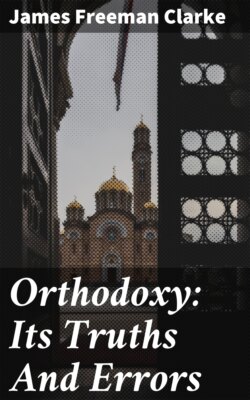Читать книгу Orthodoxy: Its Truths And Errors - James Freeman Clarke - Страница 5
На сайте Литреса книга снята с продажи.
§ 2. Logical Genesis of the Principle of Orthodoxy.
ОглавлениеTable of Contents
The principle of Orthodoxy seems to have arisen, and to have maintained itself in the Church, in some such way as this. Jesus Christ, it is assumed, came to save the soul from sin and evil. He saves the soul by the word of truth. In order that this truth shall become saving truth, it must be believed, and so strongly believed as to have a practical influence on life and action. We are therefore saved by believing the truth taught by Christ. But in order to be believed, it must be expressed in some definite statement, or in what we call Christian doctrine. But truth is one, and therefore the doctrine which expresses it must also be one.
Therefore there must be one system of Christian doctrine, containing in itself the substance of Christian truth, and constituting the object of Christian faith. This system, though it may vary in its unessential parts, must in its essence be [pg 020] unchangeable. In proportion as any system of belief varies from it, such system is heterodox and dangerous, while this system alone is orthodox and safe.
Another form of this argument would be as follows: Christ came to reveal something to men. If revealed, it must be made known. If made known, it must be capable of being so expressed that there can be no reasonable doubt concerning it. Otherwise, Christianity would not be a revelation. But if expressed so as to enter the human mind, it must be expressed in human language. A verbal revelation, therefore, is essential for the purposes of Christianity. Such a revelation is nothing else than a system of doctrine, or that which can be systematized into doctrine. And this system must be one and the same from age to age, or it is not a permanent divine revelation, but only a transient human seeking for such a revelation.
